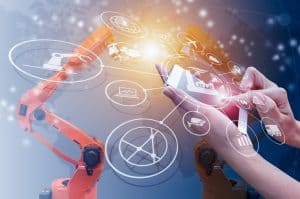
A recent survey reveals an increased upward lift in AI adoption across industries including energy, manufacturing, heavy industry, infrastructure, and transport sectors
Within five years, more than half of leaders in the manufacturing and utilities sector expect artificial intelligence to be controlling high-value assets such as industrial plants, equipment, and machines.
That’s the word from the “Next-Gen Industrial AI” survey of 515 executives released by Siemens, which. More than half, 54%, believe that within the next five years, AI will autonomously control some of their organization’s high-value assets.
See also: Auto Industry Drives The Smart Factories Movement
There are a wide range of use cases, and for starters, the survey’s authors point to health and safety. A large set of respondents (44%) believe that, over the course of the next five years, an AI system will autonomously control machines that could potentially cause injury or death. “This is important because while AI methodologies are similar across industries, the consequences of failure are not,” the survey’s authors point out. “In many industrial organizations, bad decisions can leave thousands of people without a train to work; millions of dollars can be lost if machinery overheats; slight changes in pressure can lead to an environmental catastrophe, and innumerable scenarios can lead to loss of life.”
Artificial intelligence vs. human: Who decides?
Executives were asked how AI implementations will play out as they are introduced to factory floors, facilities, and transport fleets. For example, 56% said they would accept the decision of an impressive AI model over an experienced employee (44%), where the decision would have major financial consequences.
The kinds of data that will most likely feed these AI implementations will come from equipment manufacturers (71%), followed by internal data from other divisions, regions, or departments (70%), data from suppliers (70%), and performance data from sold products in use with customers (68%).
A majority of those organizations leading the way in their AI implementations, 55%, report they have already seen positive benefits from the technology, compared to 35% of those lagging in AI. At least 32% say they have been able to automate and improve quality control, and 76% expect to do so within the next two years. Another 32% report they have employed AI to optimize systems, machines, and processes automatically, with 74% expecting to do so within the next two years. Thirty percent represent they have been able to identify risks and issue warnings, with 74% expecting to be able to see this benefit within the next two years.
The survey’s authors outline the ways artificial intelligence will impact industrial applications:
- Contextual data and simulations: “Examples include knowledge graphs, which capture the meaning of – and relationships between – items in diverse data sets, and digital twins, which provide detailed digital representations and simulations of real systems, assets, or processes.”
- Embedded AI and big picture insights: “IoT and edge technologies are giving rise to diverse machine-generated data sets which can support new levels of situational awareness and real-time insights in the cloud or directly in the field.”
- Data from beyond the walls: “Improved protocols and technologies for sharing data between organizations could support the development of AI models that simultaneously draw from the data of suppliers, partners, regulators, customers, and perhaps even competitors.”
“Ever-more powerful applications will no doubt raise new challenges,” the survey’s authors point out. “It will require trusting AI with responsibilities that were only ever given to humans. In these cases, AI applications will need to win the confidence of decision-makers, while organizations will need to develop new risk and governance frameworks.”




























